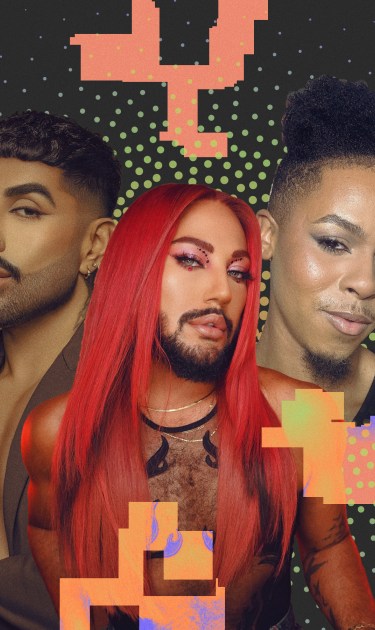The first time that Puertoriqueño David Lopez was clocked wearing makeup, he was on the subway with a guy he was dating. “Are you wearing makeup?” he asked Lopez—who had, in fact, applied concealer under his eyes. Lopez’s only response was to deny, deny, deny. “I was like, ‘What?’ I was so embarrassed, and I was like, ‘No, I would never, never put on makeup,’” he says.
Lopez, a celebrity hairstylist and beauty content creator, has been unlearning and battling stereotypes about men and makeup ever since. To that end, he’s openly donning bolder, brighter makeup, a beard, and some of the most colorful (and beautifully styled) wigs you’ll see on the internet. And he isn’t the only gay Latino helping make beauty and makeup accessible to everyone, regardless of gender.
Beauty content creator Reijour Lobos is also doing his part by uploading makeup tutorials to Instagram and TikTok. Or consider Angel Merino, beauty influencer, makeup mogul, and founder of Artist Couture, who’s been marching to the beat of his own drum for more than a decade. Each of these three Latinos grew up with — and eventually out of — erroneous cultural stereotypes about men and makeup. As adults, they’re renouncing that men can’t wear makeup and that wearing makeup means you want to be a woman. And in the process, they’re empowering others to do the same.
Below, we celebrate each trailblazer by asking them about their earliest experiences with makeup, what makeup does for them, and, à la Ru Paul’s Drag Race, what they would say to their younger selves.
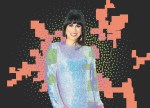
David Lopez
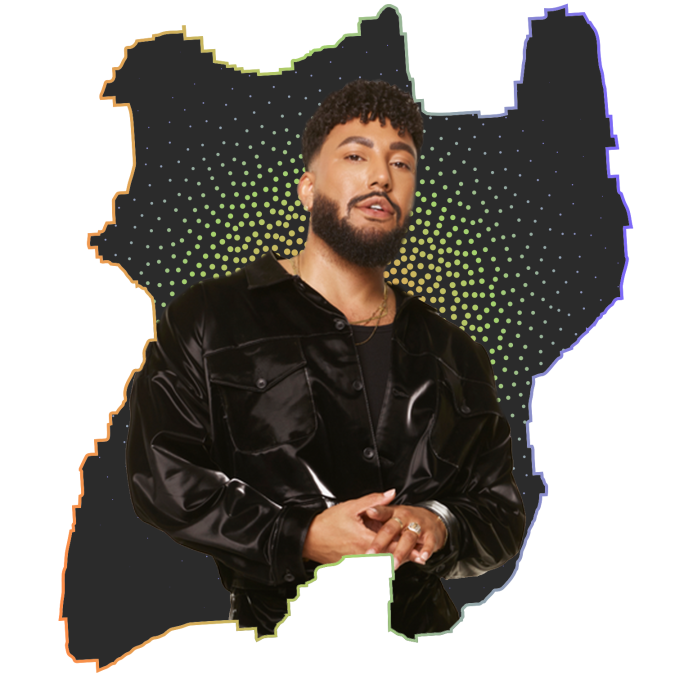
When David Lopez put on his Maybelline concealer to hide the dark circles under his eyes, he felt so hot and confident. So why would he lie about wearing products that made him feel that way? “A lot of the root of the embarrassment is that, as a queer person, you have to live life convincing people that you are as masculine as possible, that you’re not feminine in any way,” he says. “But that’s inherently misogynistic.”
In the last decades, Lopez has looked inward to debunk the lies he’s internalized. His mission, which is clearly stated in his Instagram bio, is to “degenderize the beauty space,” and he does that one iconic look at a time. One thing he wants everyone to know is that while he is a gay man who wears makeup, he’s not a gay man because he wears makeup. “My whole reason for doing this is to show people that their concept of what a man is is completely made up. It’s not real. A man putting on lashes does not make him a woman,” says Lopez.
Despite how comfortable he is in his own skin now, Lopez admits he’s still terrified to leave the house in one of his fully realized looks. “It hasn’t gotten easier because that’s the reality of being queer,” says Lopez. “I don’t take the subway looking like this because I know I’ll get beat up.” That said, he’s not letting the anti-gay brigade kill his vibe. “I take a car everywhere, but I still do it and I’m going to keep doing it. It’s so powerful.”
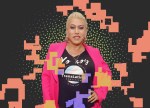
To keep his positive energy going, Lopez reminds himself of several things. First, that “The only way out is through,” he says. He also has a specific message for his inner child: “I would tell my younger self to be a little more gentle with himself. Aside from being obviously queer, I was also a weird kid in general. I felt very misunderstood,” he says. “I would say, ‘You will be misunderstood the rest of your life, so learn to live with it, love it, and use it to your benefit.”
Reijour Lobos
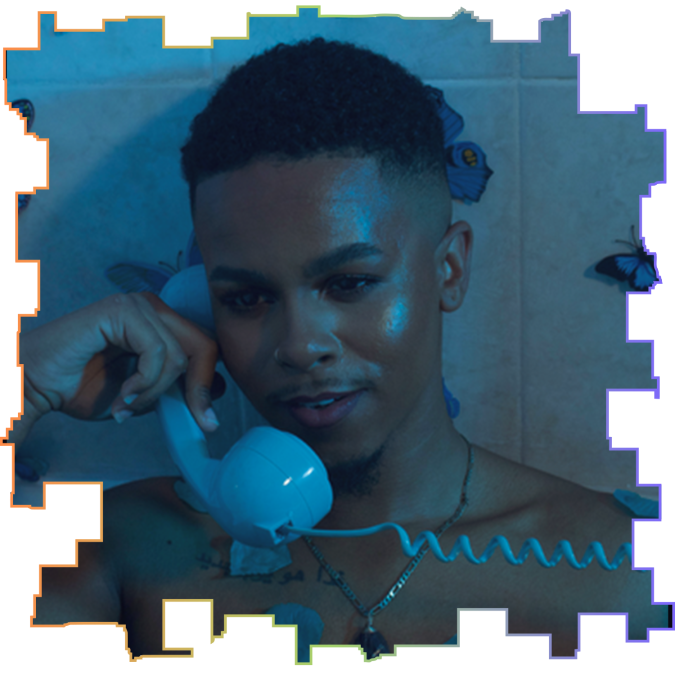
A Black Puertoriqueño based in Rhode Island, Reijour Lobos is a 27-year-old beauty content creator and a breath of fresh air. Chatting with Remezcla from his desk — behind which was a beautiful set up of pop album covers — Lobos shared that he was six when he first applied makeup. He swiped on his grandma’s L’Oreal lipstick. “She used to have this brown jewelry container that spun around and played music. I pulled out the lipstick, thinking that it was just Chapstick,” he says. He didn’t use makeup again until he was a teenager, to cover up his acne.
Lobos says he was never “caught” wearing makeup, but he also kept it light with brows and concealer. “I would stamp my eyebrows on with a brush because I thought it would look more natural, and it did not,” laughs Lobos. “And none of my friends told me that it didn’t look good. But looking back, I’m like, ‘You know what? They were letting me figure it out.’” In the decade since, he’s found his style and is reminding audiences that “it’ll all blend out okay,” as his TikTok bio reads.
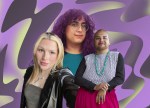
Though he was comfortable sporting makeup in front of his friends, Lobos avoided doing so at family gatherings. He “didn’t want to deal with” the questions his family would ask or the low-handed insults they’d hurl at him. Eventually, though, he threw self-pleasing to the wind. “It’s a different generation, different times. They didn’t see this, so they don’t understand it. My choices are to educate you or just to protect myself and not deal with it.” (And, for the record, each one is valid in its own right.)
The content creator would tell his younger self: “Feel okay with expressing your creativity in whatever way you want. As long as you’re having fun and you like it, it shouldn’t matter if someone else thinks that’s weird…People forget that their favorite male news anchor, sports commentator, or actor in a movie is wearing makeup.” Because makeup helps people look and feel better — and we all deserve that.
Angel Merino
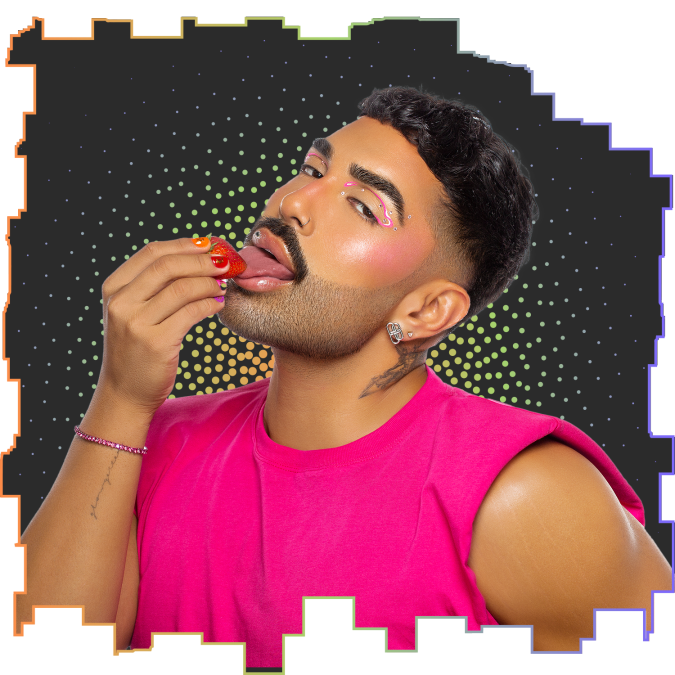
When I ask Angel Merino what his pronouns are during our phone interview, he sharply inhales and, without missing a beat, says “That. Bitch,” laughing. “No, I’m just kidding,” he says. “My pronouns are he/him.” Merino, also known as Mac Daddy, was raised by women — his amá, tías, and primas — who loved going to the beauty salon.
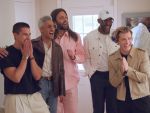
“I was always very fascinated by the way it made the important women in my life feel — specifically my mom,” says Merino. “I have very, very good memories of us going to department stores and picking up her signature burgundy lipstick. I loved seeing how that made her feel.” Naturally, he was curious if makeup would do the same thing for him. (Spoiler alert: It’s done so much more.)
At 15, Merino got his first job at a mall kiosk (iykyk) and made his first gay friend, who happened to do drag. “Up until this point, I had never really interacted with another gay person,” he tells Remezcla. “I knew that I was gay…but I was scared to come out, so I really had no one to ask questions about the way that I was feeling.” That all changed and Merino started to explore who he already was and who he wanted to be, makeup y todo.
Merino and his new friend visited MAC, where the former bought his first-ever makeup product. “I remember when I was at the counter and trying to find my shade, I felt this instant boost of confidence. There was this feeling of being home. It felt good. It made sense,” Merino says. “And, again, it was so interesting to me because I went from growing up and being around it and seeing it to actually experiencing it for myself. That was wildly unique.”
To be sure, Merino doesn’t have any plans to stop representing Latines in the beauty industry. ”I feel like that’s what it takes. It takes you seeing somebody doing something for you to feel like you can also do it.”
This post is part of Remezcla Pride 2024: Identity Edition. Read more here.
